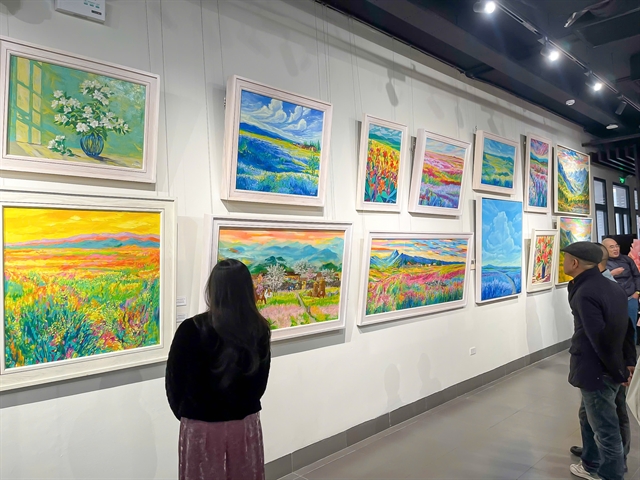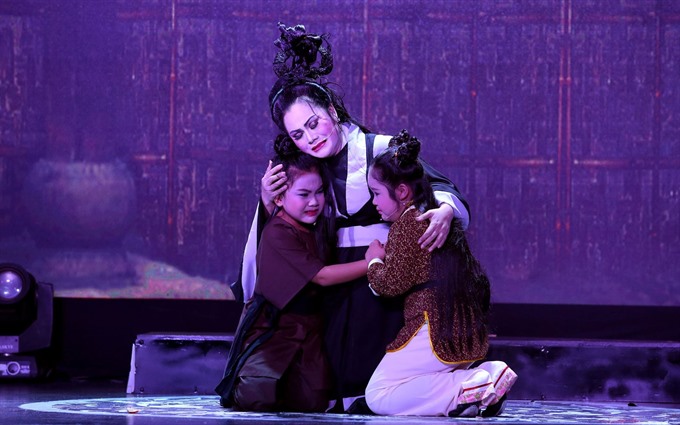 Life & Style
Life & Style

Dozens of cải lương (reformed opera) and artists from traditional troupes in HCM City will stage performances next week to commemorate the anniversary of the founding of cải lương.
 |
| Dozens of cải lương (reformed opera) and artists from traditional troupes in HCM City will stage performances to commemorate the anniversary of cải lương The event begins on September 21 or August 12 of the lunar calendar. (Photo courtesy of Lê Hoàng Drama Stage) |
HCM CITY — Dozens of cải lương (reformed opera) and artists from traditional troupes in HCM City will stage performances next week to commemorate the anniversary of the founding of cải lương.
The commemoration begins on September 21, or August 12 of the lunar calendar.
The Lê Hoàng Drama Stage in Bình Thạnh District will offer a special show called Tâm Nghề Dâng Tổ (Devotion) featuring extracts from popular plays written by Trần Hữu Trang, Hà Triều and Hoa Phượng, well known as cải lương gurus.
The event aims to raise money to help poor artists.
The show will feature veteran artists Trường Sơn, Kim Tử Long, Phượng Loan, together with young stars Võ Minh Lâm and Trinh Trinh.
"Our art is for poor theatre actors, especially the elderly and backstage workers who have devoted their life to the art," said actress Kim Ngân of Lê Hoàng Drama Stage, who is the event’s organiser.
The Hồng Liên Theatre in District 6 will organise a worship ceremony on September 21.
The event’s theme, Một Đời Nghệ Thuật (Love for Cải Lương), is meant to honour and encourage theatre artists who have devoted their life to preserve and develop the art.
Meritorious Artist Vũ Linh and Thoại Mỹ will be featured.
The artists will perform with their students, young actors Điền Trung and Thanh Thảo, in a famous play on motherhood titled Bông Hồng Cài Áo (The Rose for Mother), a work written by Hoàng Khâm.
The organisers have invited more than 300 guests, mostly poor people, to attend the show.
Artists from the Hoàng Thái Thanh Drama Troupe will offer a new play on September 23.
Veteran actors Thành Hội and Ái Như will stage Sài Gòn Có Một Ngã Tư (A Quarter of Sài Gòn), a drama featuring social issues by scriptwriter Nguyễn Thị Minh Ngọc.
The 60-minute work highlights themes of love and compassion.
A buy-one, get-one promotion is being offered.
A group of young artists from the Trần Hữu Trang Cải Lương Theatre will travel to perform in the rural districts of Cần Giờ, Bình Chánh, Nhà Bè, Củ Chi and Hóc Môn.
They will offer free shows at outdoor stages located in cultural houses during the day.
Extracts from popular cải lương operas like Huyền Thoại Người Mẹ (The Legend of Mother) and Bên Dòng Nhị Nguyệt (Living on the Nhị Nguyệt River), about parents’ love and offerings to their children, will be staged.
Repaying their ancestors
Dozens of veteran and young actors in the city and neighbouring provinces will visit the Artists’ Pagoda in Gò Vấp District to participate in free performances every night during the week of the event.
Following tradition, the artists will show their deep respect for late actress Phùng Há, a great symbol of cải lương and also founder of the pagoda.
“We will donate funds for the pagoda, the only one of its kind in the city that contains a cemetery devoted to cải lương and tuồng (classical drama) performers,” said young actress Thúy Ngân of the Trần Hữu Trang Cải Lương Theatre.
Há, who began her careeer in 1923, worked for the Tái Đồng Ban, a leading cải lương troupe in Mỹ Tho Province (now Tiền Giang Province), the cradle of cải lương art.
With her strong voice and performance skills, Há quickly became a bright star on stage.
She performed in many plays featuring the tragedy of Vietnamese women under feudalism, focusing on beautiful and virtuous girls whose suffering was caused by village officials and landowners.
She also worked hard to train younger colleagues. Many of her students, including the late actress Thanh Nga and younger performers Thanh Thanh Tâm and Thoại Mỹ, both won top prizes at national competitions and festivals.
Há spent her savings to build the Artists’ Pagoda in 1958. It serves as a place of rest for 1,000 theatre performers who were once stars on the stage but now need financial support.— VNS





 Brandinfo
Brandinfo